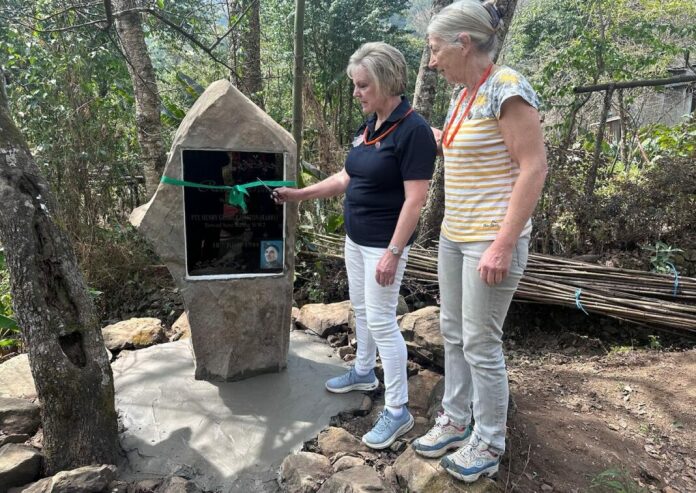A Brent Knoll resident has made a “hugely poignant and memorable” trip to South East Asia following in the footsteps of her father who fought there 80 years ago this year.
Mary Cole has just returned from a fortnight’s visit to the region to some of the battlegrounds where her father – Driver Harry Hopton 387 Coy, Royal Army Service Corps – saw combat.
Mary was also invited during her visit to unveil a special memorial to remember the events of 1944.

Talking to Burnham-On-Sea.com, she says: “At the end of 1943, much needed equipment for the war in South East Asia was taken back to England, in preparation for the D Day landings in June 1944, leaving the 14th Army with a huge logistical problem and fewer personnel to carry out allied operations.”
“When in early 1944, the Japanese came across the Burmese border in an attempt to push further into India, thousands of British and commonwealth personnel would find themselves fighting in the Arakan – north west Burma – and, the battles for Imphal and Kohima – north east India. The battles in these areas saw some of the worst fighting of WW2 due to the very challenging terrain and the fanatical and brutal Japanese army.”
“As the battles continued, such was the shortage of troops, over 300 members of Royal Army Service Corps, including my father, were given just two days training before being sent to fill the gaps in infantry.”

“In May 1944, having already been in a defensive position on the slopes around Kohima, with the Japanese still attacking allied positions, my father soon found himself attached to the 1st Battalion Royal Welch Fusiliers, who were asked to assault a 5’000ft high hill at Mao Songsong, on the Kohima to Imphal road in order to clear the hill of Japanese. This would have been a terrifying experience for any soldier, let alone those with just a few days training.”
“Fortunately, the task went well and they found the village of Okhro Ikhro at the top of hill, full of Japanese equipment and documents, but the Japanese soldiers had withdrawn just 24 hours earlier, most of them starving as they had been unable to capture vital supplies for them to continue their operations.”
Mary adds that in 2019, after being given the June 1944 Welch Fusiliers war diary and a copy of a 1944 reconnaissance map of the area, she was able to visit the hill where she placed a small photo of her father, along with a small bouquet of flowers.

“In February this year, 80 years on, I returned to the village and was asked by the tribal people who still live in Okhro Ikhro, to unveil a memorial to my father and to remember the events of 1944.”
“The memorial, which is placed under a pear tree, will eventually have a seating area and small garden around it, so that visitors and villagers can sit and enjoy the beautiful views.”
“The memorial will also be used by village school children to remember this part of their village history and the events of 1944. Although the memorial is for my father, the village intends to relay the story of the Forgotten 14th Army, commanded by General William Slim to future generations.”
Mary says her father was fortunate to survive and return to the UK but was mentally scarred from the experience.
She adds: “Many of the battles in the region often get forgotten because D-Day overshadowed the time, but what went on there in the Far East involved many thousands of British soldiers in combat there. It’s right they are remembered.”







